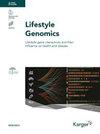Genetic and Oral Tests for the Diagnosis of Lactose Intolerance in Mixed-Ancestry Brazilians with Metabolic Syndrome
IF 2
4区 医学
Q3 GENETICS & HEREDITY
引用次数: 2
Abstract
Background/Aims: Metabolic syndrome (MetS) comprises a cluster of physiological and anthropometric abnormalities. MetS has been linked to lactose intolerance (LI). The aim of this study was to compare the sensitivity and specificity to detect LI using 2 different tests: (1) a genetic test and (2) an oral lactose tolerance test (OLTT). Methods: Two hundred and fifty-four MetS patients, ≥20 years of age, of both genders, were recruited for this comparative study. Nine single nucleotide polymorphisms (SNPs) were selected for genetic investigation: rs182549and rs4988235(both considered “gold standard”); rs56064699; rs148142676; rs562211644; rs59533246; rs3754689; rs2278544,and rs10552864(as potential novel SNPs). Sensitivity and specificity, as well as positive and negative predictive values, were calculated for each genotype using WINPEPI version 11.65. Differences between positive and negative OLTT groups were considered statistically significant when p ≤ 0.05. Results: Among the selected SNPs, only rs182549(p < 0.001) and rs4988235(p < 0.001) gave similar results compared to an OLTT. The sensitivity of both SNPs to detect LI was 87 and 86%, and specificity was 83 and 82.5%, respectively. Conclusion: Genetic tests using rs182549and rs4988235SNPs showed high agreement with OLTT. These genetic tests may be a good option to replace OLTT in MetS patients.遗传和口腔测试诊断巴西混血儿代谢综合征乳糖不耐受
背景/目的:代谢综合征(MetS)包括一系列生理和人体测量异常。MetS与乳糖不耐症(LI)有关。本研究的目的是比较两种不同检测方法检测LI的敏感性和特异性:(1)基因检测和(2)口服乳糖耐量试验(OLTT)。方法:这项比较研究招募了254名年龄≥20岁的MetS患者,男女不限。选择9个单核苷酸多态性(snp)进行遗传研究:rs182549和rs4988235(均被认为是“金标准”);rs56064699;rs148142676;rs562211644;rs59533246;rs3754689;rs2278544和rs10552864(作为潜在的新snp)。使用WINPEPI version 11.65计算每种基因型的敏感性和特异性以及阳性和阴性预测值。当p≤0.05时,认为OLTT阳性组与阴性组之间差异有统计学意义。结果:在所选snp中,只有rs182549(p < 0.001)和rs4988235(p < 0.001)的结果与OLTT相似。两种snp检测LI的敏感性分别为87%和86%,特异性分别为83%和82.5%。结论:rs182549和rs4988235snp基因检测结果与OLTT高度一致。在met患者中,这些基因检测可能是替代OLTT的一个很好的选择。
本文章由计算机程序翻译,如有差异,请以英文原文为准。
求助全文
约1分钟内获得全文
求助全文
来源期刊

Lifestyle Genomics
Agricultural and Biological Sciences-Food Science
CiteScore
4.00
自引率
7.70%
发文量
11
审稿时长
28 weeks
期刊介绍:
Lifestyle Genomics aims to provide a forum for highlighting new advances in the broad area of lifestyle-gene interactions and their influence on health and disease. The journal welcomes novel contributions that investigate how genetics may influence a person’s response to lifestyle factors, such as diet and nutrition, natural health products, physical activity, and sleep, amongst others. Additionally, contributions examining how lifestyle factors influence the expression/abundance of genes, proteins and metabolites in cell and animal models as well as in humans are also of interest. The journal will publish high-quality original research papers, brief research communications, reviews outlining timely advances in the field, and brief research methods pertaining to lifestyle genomics. It will also include a unique section under the heading “Market Place” presenting articles of companies active in the area of lifestyle genomics. Research articles will undergo rigorous scientific as well as statistical/bioinformatic review to ensure excellence.
 求助内容:
求助内容: 应助结果提醒方式:
应助结果提醒方式:


